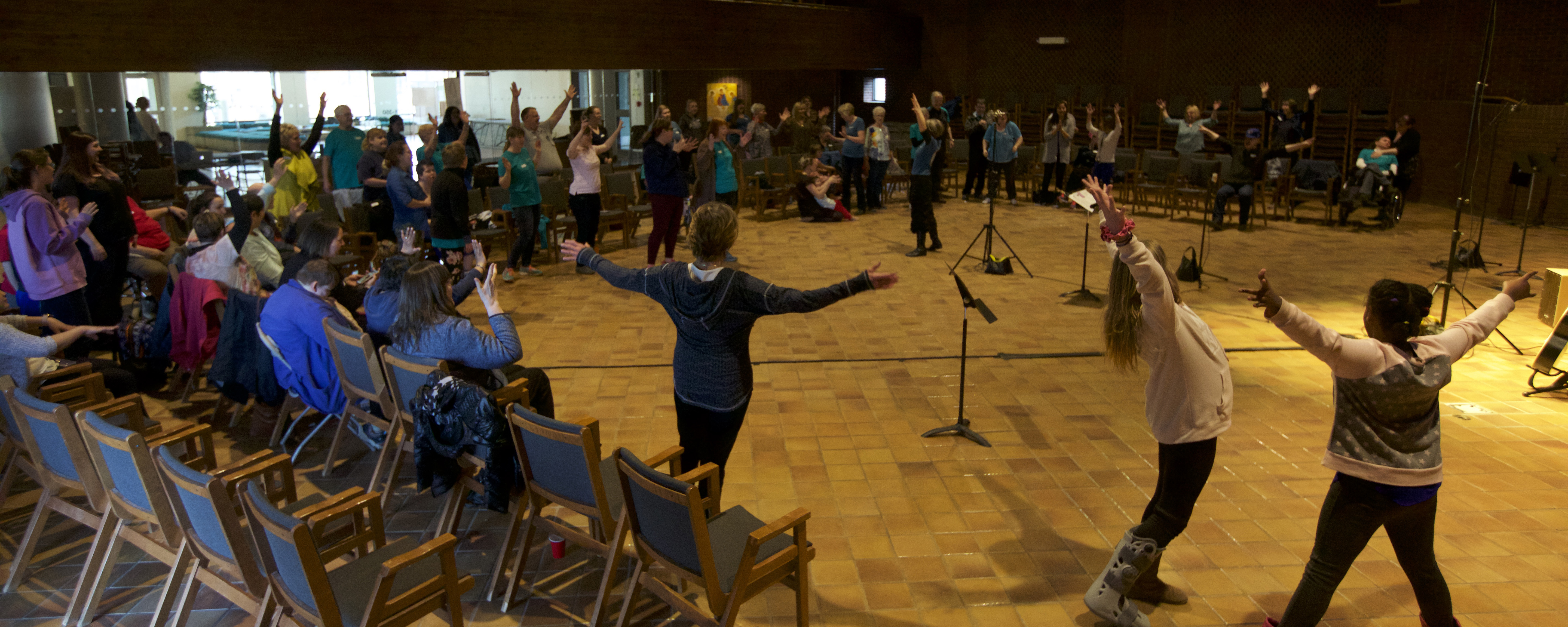Sing it loud, sing it long
Kate Black, '16 BA - 16 December 2022

When Ardelle Ries, ’83 BMus, ’98 MMus, ’04 DMus, sent out an open invitation for a multigenerational community choir in Camrose, Alta., she expected a dozen or so people to show up.
She was stunned to see as many as 100 singers — of all abilities and ages, from six months old to octogenarians — attend the weekly practices.
Ries, a professor of music at the U of A’s Augustana Campus, launched SingAble in 2018 as a choir for all ages and stages of life who love to sing, including people with disabilities and their caretakers. Her goal was to bridge boundaries between groups that face obstacles in making music and the broader community. She wanted everyone in the city of 20,000 to feel welcome, because she knows the power of singing to improve health and mental health and to create healthier communities.
The choir’s motto is, “We love to sing because we are able.”
Ries believes deeply that everyone is able. We caught up with her to learn more about the benefits of singing and ask how to make it a bigger part of our lives.
The idea of “non-singers” is a myth
The thought of not being talented enough to sing is exclusive to competitive Western European performance practice conventions , Ries says — sometimes as early as elementary school, exclusive choirs and auditions separate the “good” singers from the “bad.” We also put performers on a cultural pedestal, a stage, while the audience sits silently in the dark.
Enrolling in voice lessons or joining a choir may seem daunting as a first step in weaving more singing into your life. If so, begin by challenging the non-singer myths you may have taken to heart.
“Try on your voice at home, in the shower, sing along with recordings. Or sing with friends or family members who are full of unconditional love. Accept the glorious gift of your voice!” Ries says.
“Leap and release judgment. The voice you have is so intimately connected to the person that you are.”
Music is fundamental to life
From marking celebrations to passing along ancestral knowledge, singing has existed in every group of people, in every culture, at every time, Ries says.
“That’s where musicality originates, right from the beginning of time,” Ries says. “As music is vibration and frequency, one could say that the vibrations in the solar system, the planets, the stars and, eventually, our very bodies here on Earth, are music,” she says.
“Even in the womb, the child hears the beat of the parent’s heart and the melody of their voice. We are conditioned to respond to rhythm, melody, timbre …”
Ries adds that music isn’t something only heard with the ears. Think of the way powerful bass tones from a speaker vibrate against your skin. People with sensory disabilities, such as deafness, experience and make music through sensations inspired by these vibrations.
Singing does the body (and mind) good
Research has proven the mental and physical health benefits of all kinds of music-making and listening. Singing, Ries says, has a particularly special effect.
“We’re actually producing the sound within our body,” she says. “That makes it one step more beneficial than playing the piano or other instruments.”
The deep breathing involved in singing improves our cardiovascular and respiratory health, for example, and singers have higher levels of virus and bacteria-fighting immunoglobulin, Ries says. One study found less cortisol in people’s saliva after singing.
Singing has been proven to help people with neurological conditions, such as Parkinson’s or post-stroke aphasia, or to improve their speech. Alzheimer’s disease often doesn’t damage the areas responsible for musical memory, which means someone can enjoy the health benefits of singing and express themselves even after memories of faces and names have faded away.
Choirs make strong communities
Engaging with music makes us better listeners in more ways than one, says Ries. It heightens our abilities to recognize different sounds and notes, of course. But perhaps more importantly, research shows that “musicking” — doing anything involving music — makes people more emotionally sensitive: attuned to other people’s feelings, ideas and needs.
Watching SingAble’s participants lean on each other through the pandemic with Zoom sessions, and now, finally, gathering in the same room again, "reminds me of the 'enable-ist' power of making music together," says Ries.
“We need music and we need singing more than ever before.”